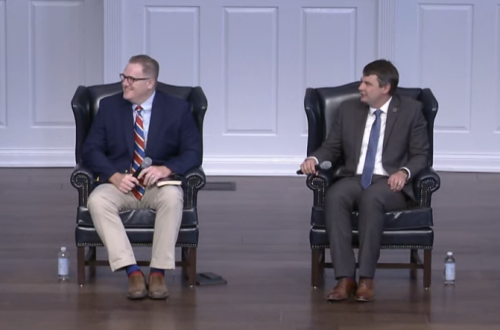 Andrew Walker has a very helpful article over at The Federalist titled “Jesus and the Same-sex Marriage Debate.” In it he argues that the sexual revolutionaries have been trying to get Jesus on the side of gay marriage by reinterpreting the biblical text. He writes,
Andrew Walker has a very helpful article over at The Federalist titled “Jesus and the Same-sex Marriage Debate.” In it he argues that the sexual revolutionaries have been trying to get Jesus on the side of gay marriage by reinterpreting the biblical text. He writes,
Perhaps the most common argument issues from silence: Jesus never mentions homosexuality or same-sex marriage; therefore, he must be for it. But this argument from silence presents another set of troubling conclusions. Namely, that whatever Jesus didn’t specifically address, he must endorse.
If we accept this contorted logic, Jesus must also support human trafficking because he never spoke out against it. Failing to withstand even a modicum of scrutiny, we know such an argument is absurd and even harmful, but that doesn’t stop individuals wishing to re-cast Jesus into a same-sex marriage activist from suspending logic and proceeding with bad arguments.
This article is really well done. Read the rest of it here.




3 Comments
Chris Ryan
Yes its unfortunately true that some segments of Christianity are trying to cast Jesus as a same sex marriage supporter. This is indescribably sad to me & a refutation of explicit Scripture otherwise.
I’m glad that Walker brought up the slavery example. It indicates Christ’s elevation of personal salvation over public policy. In this vein it doesn’t much matter if gay marriage is legal as a civil matter, so long as the Church continues to count homosexuality as a sin and to witness to homosexuals.
Don Johnson
Jesus was a Jew and taught Torah and the correct interpretation of Torah (and did many other things not relevant to this discussion, including being Messiah). When Jesus is silent on something that is taught in Torah, it is reasonable to assume that he agreed with what is taught in Torah.
Curt Day
The question for Christians is not whether same-sex marriage is biblical. The answer is obviously no. But the real question for Christians is how should we react to same-sex marriage in society. Should we do all we can to legislate against it on the grounds written in the article cited above? Or, shall we rely on preach alone to confront the desire for people in our society to engage in same-sex marriage.
If we choose the former, we will build arguments for heterosexual marriage in such a way that those practicing same-sex marriage cannot imitate. This is why we put the emphasis on children. We promote laws prohibiting same-sex marriage because it cannot produce and raise children like heterosexual marriage. But before proceeding, we must ask what is the collateral damage? If legislate against same-sex marriage because marriage must revolve around bearing children, then should we also legislate against those heterosexual marriages where the couples purposely prevent themselves from having children? After all, if the key is bearing and raising children, then the same standard must be applied to heterosexual couples as it is attempted to be applied to same-sex couples.
In addition, could we use the same logic prohibiting same-sex marriage to mandate that single parents give up their children regardless of their ability and willingness to support them.
Children are important but what marriage revolves around is the union of two adults and this union is both physical and legal. How spiritual, emotional, and personal the union becomes depends on other factors.
No one can biblically argue to condone same-sex marriages in the church. But if we can force society to ban same-sex marriage there, what else can we force society to do? Can we force it to ban other religions since those religions lead people away from Christ?
Martin Luther to German society that if society doesn’t punish the Jews for their unbelief, it will be complicit in their unbelief. And thus what Luther recommended in terms of how Germans should treat Jews, was just 1 and 1/2 steps behind what Hitler actually did. So should we ban same-sex marriage or we will become complicit? And how is Christianity viewed by the unbeliever when we try to force our personal morals of behavior on actions that does not harm others? We can claim to be paternalistic in our motives but that will not stop the backlash fueled by legitimate anger.
The question we have to ask ourselves is whether the Gospel is enough to rely on to confront people about same-sex marriage or do we need to legislate either instead of or in addition to preaching.